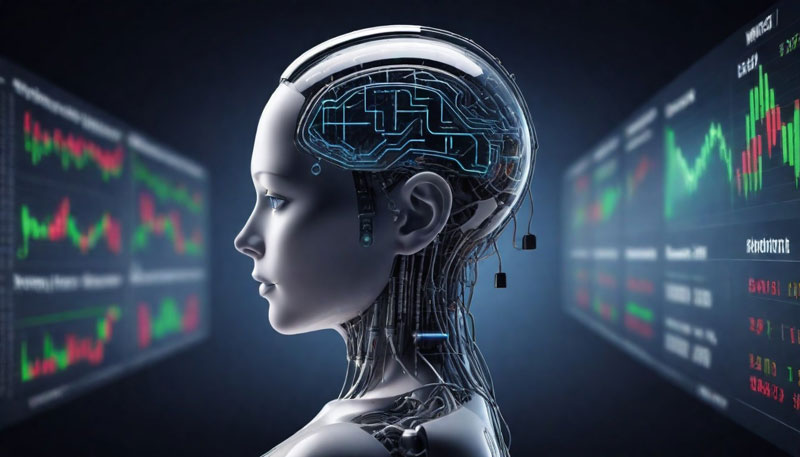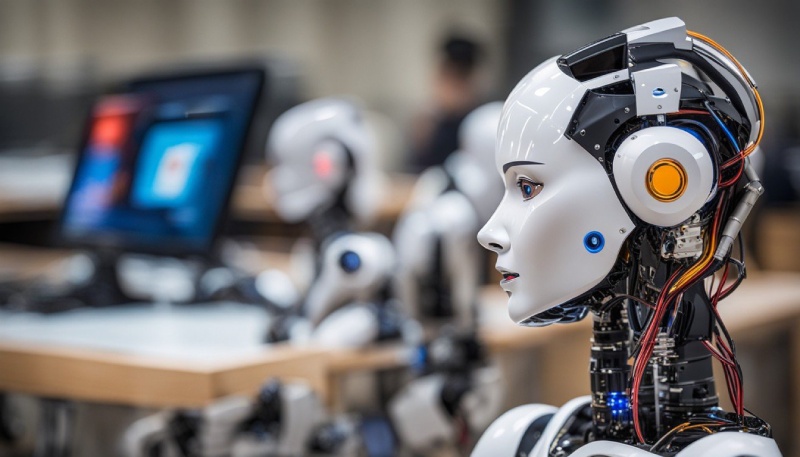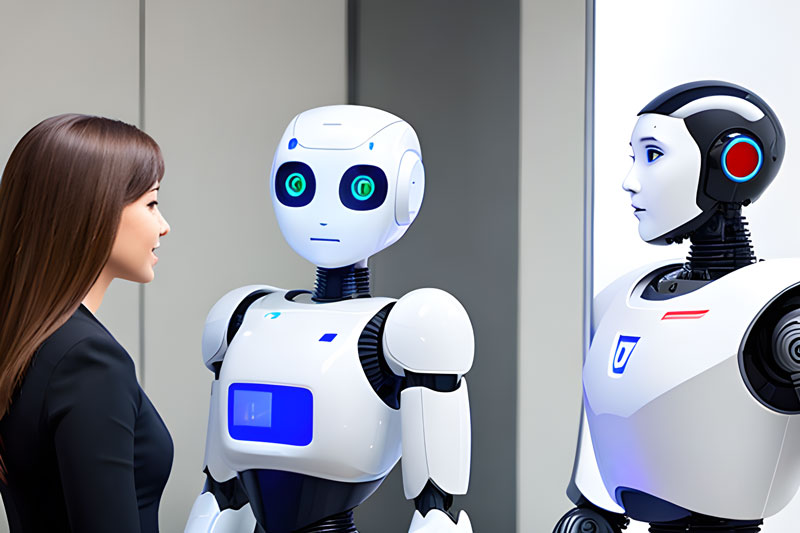Best Books to Learn AI : Artificial Intelligence (AI) is a dynamic and rapidly evolving field that has a profound impact on various industries and aspects of our daily lives. Whether you’re a newcomer seeking to understand the fundamentals or a seasoned practitioner looking to delve deeper into the latest advancements, a solid foundation in AI is essential.
To assist you in your AI journey, we’ve curated a list of some of the best books that cover a broad spectrum of AI topics. These books are carefully chosen to cater to a range of interests, from machine learning and deep learning to natural language processing and reinforcement learning. They provide both theoretical knowledge and practical insights, making them valuable resources for students, researchers, and professionals alike.
Let’s explore these recommended books to discover the insights, techniques, and applications that drive the field of AI forward.
Top 10 Free Midjourney Alternatives | Free AI Image Generators
Supervised Learning Types & Methods Explained
Learning Rate Scheduler Explained with an Example in Pytorch
you may be interested in the above articles in irabrod.
Top 10 Best Books to Learn AI
Here is a list of some of the best books to learn Artificial Intelligence (AI). These books cover a range of topics within AI, from the basics to more advanced concepts and applications:
1. “Artificial Intelligence: A Modern Approach” by Stuart Russell and Peter Norvig:
This widely used textbook provides a comprehensive introduction to AI, covering a wide range of topics, including machine learning, robotics, and natural language processing.
“Artificial Intelligence: A Modern Approach” by Stuart Russell and Peter Norvig is an iconic and comprehensive textbook that has become a standard in the field of AI education. This well-regarded resource offers a thorough exploration of artificial intelligence concepts and techniques, covering topics from problem-solving and knowledge representation to machine learning and robotics. With its rigorous yet accessible approach, it serves as an invaluable guide for both students and practitioners, providing a deep understanding of the foundations of AI and practical insights for building intelligent systems. Whether you’re new to AI or a seasoned expert, this book is an essential reference, making it one of the most widely used and respected texts in the realm of artificial intelligence.
2. “Deep Learning” by Ian Goodfellow, Yoshua Bengio, and Aaron Courville:
This book offers an in-depth exploration of deep learning techniques, neural networks, and their applications. It’s an excellent resource for those interested in deep learning.
“Deep Learning” by Ian Goodfellow, Yoshua Bengio, and Aaron Courville is a seminal textbook that has revolutionized the field of deep learning. This comprehensive resource offers an in-depth exploration of the principles and practices of deep neural networks, making it a fundamental reference for researchers, students, and practitioners in the domain of artificial intelligence. The book covers a wide range of topics, including neural network fundamentals, optimization techniques, unsupervised learning, and more. With its clear explanations and practical insights, it serves as a cornerstone text for understanding the complexities of deep learning, establishing it as a must-read for anyone looking to delve into the fascinating world of neural networks and artificial intelligence.
3. “Pattern Recognition and Machine Learning” by Christopher M. Bishop:
This book provides a solid foundation in machine learning and pattern recognition, covering fundamental concepts, algorithms, and statistical techniques.
“Pattern Recognition and Machine Learning” by Christopher M. Bishop is among the best books to learn ai. It is an invaluable resource that bridges the gap between theory and application in the field of pattern recognition and machine learning. It provides a comprehensive and accessible introduction to the fundamental concepts of pattern recognition, making it suitable for both newcomers and experts in the field. The book covers topics such as probabilistic graphical models, support vector machines, and neural networks, all within a context of real-world applications. Its lucid explanations, practical examples, and exercises contribute to a rich learning experience and make it an essential reference for students and practitioners seeking to master pattern recognition and machine learning techniques.
4. “Reinforcement Learning: An Introduction” by Richard S. Sutton and Andrew G. Barto:
If you’re interested in reinforcement learning, this book is a great starting point. It covers the core concepts and algorithms in reinforcement learning.
“Reinforcement Learning: An Introduction” by Richard S. Sutton and Andrew G. Barto is a seminal work in the field of reinforcement learning, providing a comprehensive and authoritative guide to this exciting area of machine learning. The book offers a deep exploration of the fundamentals, algorithms, and practical applications of reinforcement learning, making it an ideal resource for students, researchers, and professionals. Sutton and Barto’s clear and engaging writing style, coupled with illustrative examples, facilitates a strong understanding of the core concepts and principles behind reinforcement learning. This book serves as a foundational text that continues to shape the field and is an essential read for anyone interested in this rapidly evolving area of artificial intelligence.
5. “Python Machine Learning” by Sebastian Raschka and Vahid Mirjalili:
This book is an excellent resource for those who want to learn practical machine learning with Python. It covers various machine learning techniques and includes hands-on examples.
“Python Machine Learning” by Sebastian Raschka and Vahid Mirjalili is among the best books to learn ai. It is an accessible and practical guide that empowers readers to dive into the world of machine learning using Python. This book combines theoretical insights with hands-on implementation, making it an excellent choice for both beginners and experienced practitioners. It covers a wide range of machine learning topics, including classification, regression, clustering, and more, while providing code examples and real-world applications. With a clear and engaging writing style, Raschka and Mirjalili offer a valuable resource for those looking to develop their Python machine learning skills and apply them to real-world problems. This book is a must-read for anyone seeking a solid foundation in the field of machine learning with Python.
6. “Machine Learning: The Art and Science of Algorithms that Make Sense of Data” by Peter Flach:
This book is suitable for those who want to understand the fundamental principles of machine learning and its practical applications.
“Machine Learning: The Art and Science of Algorithms that Make Sense of Data” by Peter Flach is a comprehensive introduction to the fundamental concepts and techniques of machine learning. This book serves as an excellent starting point for readers interested in understanding the core principles of machine learning and how it can be applied to make sense of data. It covers a wide range of topics, from the basics of data preprocessing and feature engineering to various machine learning algorithms and their practical applications. Flach’s clear and accessible writing style, along with practical examples, makes this book a valuable resource for students, researchers, and professionals looking to gain a solid foundation in the art and science of machine learning.
7. “Python Deep Learning” by Ivan Vasilev and Daniel Slater:
If you’re interested in deep learning with Python, this book provides a practical approach to building deep neural networks for various applications.
“Python Deep Learning” by Ivan Vasilev and Daniel Slater is an essential guide for those looking to dive into the world of deep learning using Python. This book is among the best books to learn ai, It offers a hands-on approach to understanding and implementing deep learning concepts and techniques, providing readers with practical insights into neural networks, deep learning frameworks, and real-world applications. With a focus on practical examples and exercises, this book equips readers with the skills needed to build and train deep learning models, making it an excellent resource for both beginners and experienced practitioners in the field of deep learning and artificial intelligence.
8. “Natural Language Processing in Action” by Lane, Howard, and Hapke:
This book is a great resource for anyone interested in natural language processing (NLP) and text analysis, with hands-on examples and practical applications.
“Natural Language Processing in Action” by Lane, Howard, and Hapke is a comprehensive guide that delves into the world of natural language processing (NLP). This book provides a practical, hands-on approach to NLP concepts and techniques, making it an ideal resource for both beginners and experienced practitioners. With a focus on real-world applications, it offers valuable insights into language understanding, text analysis, and building NLP models. By combining theory with practical examples and exercises, the book equips readers with the skills needed to work with text data effectively, making it a must-read for anyone interested in harnessing the power of NLP for various applications.
9. “Artificial Intelligence: Foundations of Computational Agents” by David L. Poole and Alan K. Mackworth:
This is an online, freely available textbook that provides a comprehensive introduction to AI. It’s great for self-learners.
“Artificial Intelligence: Foundations of Computational Agents” by David L. Poole and Alan K. Mackworth is among the best books to learn ai. It is an exceptional resource that explores the fundamental principles and algorithms underlying artificial intelligence (AI). With a strong emphasis on computational aspects, the book covers a wide range of AI topics, including search, planning, machine learning, and more. What sets this book apart is its interactive and online nature, as it offers an online version with links to interactive illustrations, practice exercises, and assignments, making it an invaluable tool for self-paced learning and teaching. This book serves as a foundational text for those looking to develop a deep understanding of AI and computational approaches to solving complex problems.
10. “Hands-On Machine Learning with Scikit-Learn, Keras, and TensorFlow” by Aurélien Géron:
This book is focused on practical machine learning and deep learning using popular Python libraries.
“Hands-On Machine Learning with Scikit-Learn, Keras, and TensorFlow” by Aurélien Géron is a highly regarded resource for anyone looking to dive into practical machine learning and deep learning. This book provides a hands-on approach, focusing on real-world applications and practical implementation. It covers the essential libraries and tools like Scikit-Learn, Keras, and TensorFlow, making it an ideal choice for both beginners and experienced practitioners. Géron explains complex concepts in a clear and approachable manner, ensuring that readers gain a strong foundation in machine learning and neural networks. With a plethora of examples and exercises, this book is a valuable guide for building and deploying machine learning models.
Remember that AI is a vast and evolving field, so the best book for you depends on your specific interests and background. Whether you’re new to AI or looking to deepen your knowledge, these books should provide a good starting point.
Conclusion
In conclusion, the field of Artificial Intelligence is dynamic and ever-expanding, offering a multitude of opportunities to learn, explore, and innovate. The books listed here serve as invaluable guides to help you navigate the diverse domains of AI, whether you’re a beginner embarking on your AI journey or an experienced practitioner aiming to stay at the forefront of this rapidly evolving field.
These books are not just educational tools; they are gateways to unlocking the power of AI. They provide you with the foundational knowledge to understand the underlying principles, the practical insights to apply AI techniques effectively, and the inspiration to contribute to the ongoing AI revolution.
As AI continues to shape our world, being well-versed in its principles and practices is an asset that can open doors to a wide range of opportunities. We hope this list of the best AI books equips you with the knowledge you need to explore, innovate, and contribute to this exciting field. Happy reading, learning, and discovering!








